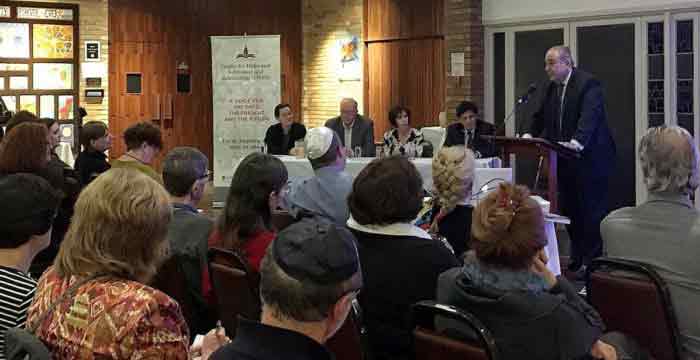
Ambassador Barkan at CHES Forum for Descendants with moderator Prof. Rebecca Margolis and panelists Prof. Jan Grabowski, Elin Beaumont and Lawrence Greenspon.[/caption]
The program for Descendants of Holocaust Survivors, presented by the Centre for Holocaust Education and Scholarship (CHES) on November 14th at KBI Congregation, was as insightful as it was inspiring.
The Evening of Memory, Identity and Emerging Narratives, was opened with greetings from Israeli Ambassador to Canada Nimrod Barkan. In 1939, at the age of 15, his father was sent by his parents (Barkan’s grandparents) to then British Palestine to escape conditions for Jews in Budapest, Hungary. Barkan’s father later joined the Jewish Brigade in the fight against the Nazis. On his arrival in Budapest as a Jewish soldier, he discovered that his father (Barkan’s grandfather), who had saved him, perished at the hands of the Nazis.
All five speakers and panelists had a unique family story that they told from the heart, while each presented a different perspective on the same topic. “What they all had in common was a strong desire to impress upon the audience the urgency to remember and how this memory has shaped them, such that now their emerging narratives are shared and turned into action,” says Batia Winer, sub-committee chair of the CHES descendants’ program.
Ambassador Barkan’s opening remarks were followed by a special video message from Artur Wilczynski, Canada’s ambassador to Norway and Canada’s representative to the International Holocaust Remembrance Alliance. Artur, whose Polish-born family had lived out the Holocaust in Russia, was forced from Poland a second time after the war, when Artur was just a child. This history has influenced his personal and professional life.
“Each testimony of our existence shows the Nazis failed and honours the sacrifice of our families,” says Artur. Beyond speaking out, Artur adds: “We have to use this period in history to create a more just and equitable future for all.”
The theme was echoed by the other panelists, each in their own way. Elin Beaumont, Educational Outreach and Program Facilitator for the Azrieli Foundation Holocaust Survivor Memoirs Program in Toronto, spoke of her father who survived Auschwitz but lost his entire family. He covered his branded number with a maple leaf when he came to Canada. Elin was left with many unanswered questions. Her father’s experiences compelled her to research his past, after he passed at 63. Elin discussed the results of her research, which include an impressive number of authentic documents that revealed his untold story. Elin became involved in promoting the memoirs of others through her career, “so the truth does not become distorted.”
Lawrence Greenspon, criminal defense and personal injury litigation lawyer in Ottawa, spoke of his beloved Polish-born step-father, a Survivor, leaving the audience with two key lessons: “If there is one thing more than all, dad has taught me perseverance. Having come to America with nothing, no one, and not able to speak the language, he persevered and accomplished so much; in the end, he was able to raise a family and live a normal life, in spite of losing his family at the hands of the Nazis.” His father also advised how to approach life challenges: “If you want to make yourself bigger than the next guy, stand up on a chair.”
The final panelist, Professor Jan Grabowski, Department of History, University of Ottawa, held the audience spellbound with his firsthand experience of the antisemitism that still existed in Poland well after the War. He grew up in Warsaw, which he calls “one huge cemetery” as the son of a Polish mother from a noble family and a Jewish father, a fact he only discovered as an adolescent. He says this ancestry “tainted” him in Poland and had a profound impact on his life. His career today involves researching, teaching and writing the truth of Poland’s wartime history. One of his books, Hunt for the Jews, about betrayal and murder in German-occupied Poland, won the Yad Vashem International Book Prize in 2014.
Lawrence Greenspon concluded his talk with words that reflected the views of all the panelists: “Let us never be indifferent to the plight of others; let us feel their indignity and hear their cries and let us take action to help, and persevere in our efforts to make change.”
The event was moderated by Professor Rebecca Margolis of the Vered Jewish Canadian Studies Program at the University of Ottawa, herself a child of Survivors. This is the second year that CHES offers a program for descendants as part of Holocaust Education Month. Questions from the audience also added to the ongoing conversation about the role and responsibilities we hold today as second- and third-generation Holocaust Survivors.
By: Toby Herscovitch
Source: CIJA